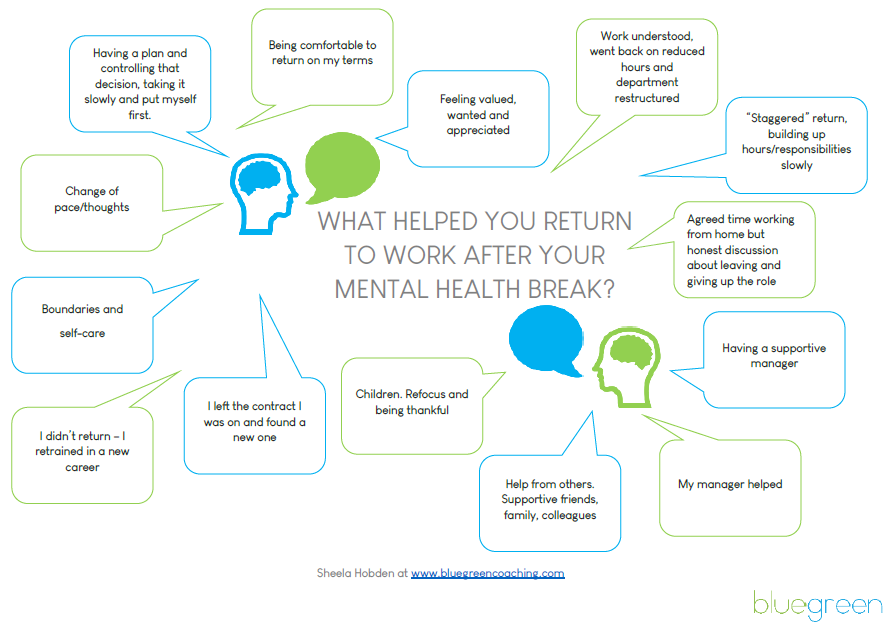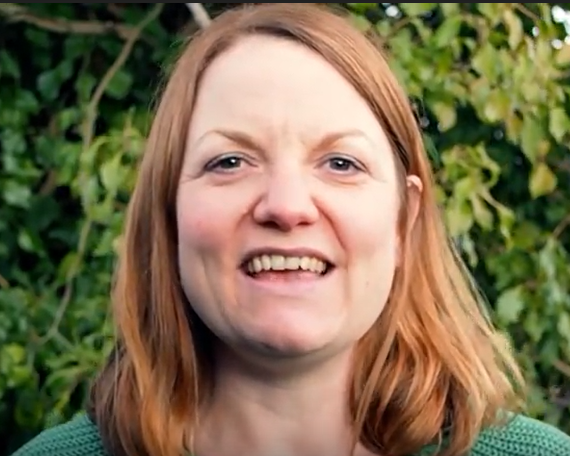
So you took the time out – your sought help.
A brave thing to do.
But now, the thing causing you trouble is the return to work.
This piece aims to share ideas which seek to make that transition as smooth as possible. Whilst there is no right way to do these things, there is YOUR way, in the context of YOUR world.
I do hope something here is helpful in mapping out the discomfort and finding a strategy to get you through, feeling strong and in control.
For background, the rationale for writing this is, that when I was off work with depression, one of the things I found most uncomfortable, was the thought of returning. I had been worried about this before I even took time out (“if I take time off, how will I ever go back?” was a repeating question).
I did take the time out. I went through that process. I managed a team of people at the time and the other question that I kept turning over (and over and some more!) was what they would be thinking and saying about me?

Working remotely at this time meant that I didn’t have to face the “walk into the office”. However, what it did mean, was that I had to personally call each of my team to re-engage with them. A 1-1 conversation filled me with dread just the same! I remember sitting at my desk procrastinating and doing my breathing exercises to get myself ready for the call.
I DID pick up the phone.
I was a little shaky but made the first call.
It’s really easy to build this false view that everyone is talking about the fact that you’ve been off, questioning “why she couldn’t cope?” or “is she really fit to be back?”.
In reality, people generally come from a place of compassion and genuine concern and in all honesty, most of the time they have more than enough going on in their own lives to get too pre-occupied with you!
Individual conversations don’t feature in my memory, more a collective sense of understanding and support. There was definitely something around humanising what had happened. I certainly felt much better in being able to have open conversations with people and normalising it. This actually reinforced for me that I had been brave to stand out and say that I needed time off and returning confidently cemented that it had been the right thing to do.

Now to combine that experience with those of people I have partnered with to successfully integrate them back into work. Here are some ideas and questions to work through
1 How have you been keeping in touch with your colleagues?
- Some people found that as they were approaching the return to work, it was useful to talk to people at work whom you trust, to get a sense of “being back”. Some have likened it to the KIT (Keeping in Touch) days that are part of maternity leave.
- This is worth considering, to build a bit of knowledge and trust before your return if appropriate in your situation.
- What conversations need to happen? Where and how do you want these to take place? Think right down to the detail of the time of day, place and setting (if possible) so that you feel in control of the situation before it happens.
2 How do you want to return to work?
There are certain legal criteria that an organisation must adhere to when people return from absence in relation to mental health. These include things like Phased Return and Reasonable Adjustments.
You should be involved in these discussions so it is worth thinking about:
- What will it feel like to manage with my original working pattern?
- What changes might I need?
- What would be most helpful in terms of a smooth transition e.g. times of day, days of the week, type of tasks, environment?
3 What do you want people to know about your absence and return?
- Legally the reasons you have been off are confidential, however, depending on your circumstances, you may want people to know whats been happening for you.
- What do YOU WANT them to know? Be clear about this with whoever your representative is at work This may help with any worries about what’s being assumed or said (whether these worries are real or perceived).
4 How do you want your first day back to be?
- One of the most daunting things is the “entry to the building”, not only that, the whole lead up to it, right back to getting ready the night before. It can be fraught with potential triggers.
- This exercise may help prepare you for that:
- Visualise the whole “journey” from the evening before through to coming home at the end of the working day. Ask yourself this series of questions:
- What is the best preparation you can do the night before?
- What things make you feel great when you wake in the morning? Plan to do one of them
- What will help you maintain that positive attitude?
- What do you need to take with you?
- What would be the ideal time to arrive?
- As you visualise entering the building, or speaking to your colleagues, pause for a moment. Step into the shoes of your colleagues, what will they see, think, do? How different is that to your views?
- Who would you most like to talk to, by way of a gentle re-introduction?
- What will you say to people?
- If you feel uncomfortable, how will you handle it?
- What will you do during your lunchbreak?
- What will you do when you arrive home, to celebrate?
- What check-ins do you need for yourself – before you go, during the day, when you get home?
- Visualise the whole “journey” from the evening before through to coming home at the end of the working day. Ask yourself this series of questions:
5 Who do you need to talk to, or what support do you need, to make sure that smooth “journey” happens as you plan?
- Many of the elements listed are in your control and this is an important point to remember
- The parts that are not in your control, you can ask for, and/or change your response to, if they don’t fall as planned
- Recognising that level of control will be super helpful
There might be some very difficult situations, whereby the workplace was the root of your issues and on returning, it is all brought back. The question in this situation is; what are you prepared to do in order to “survive”. This links again to control as well as choice. Where you haven’t got control, what responses can you shift?
Many people feel they have no choice, however we get confused with the consequences of choice, rather than the choice itself. That’s a whole new topic, so do read more in the Control article.
Another article I have in progress is “Love it or Leave it”, in which I explore how we decide whether to learn to live with what we are doing, or cut it….and move on to something new.
What next?
You’ll need to sustain your well-being once back in the workplace, so what is your plan for that?
Here are some ideas, if you haven’t already come across these articles and resources:
- Read “A vehicle for well-being”
- Take the “MOT4U”
This article forms part of the Mental Health Time Out series:
- How to Know When To Take Time Out for Mental Health
- How to have that Difficult Conversations you’ve been putting off
- What To Do With Time Out for Mental Health
- How to Return Well after a Mental Health break

Sheela Hobden is a Coach at bluegreen Coaching. Following her own mental health battles, she now coaches individuals, runs training sessions and speaks at conferences. She has a real passion for helping medics and healthcare professionals take as much care of themselves as they do their patients in whatever life or career conundrums they face! She is also a Mentor Coach and Coach Supervisor. She has a PGCERT in Business and Personal Coaching, holds PCC member status with the ICF and is CIPD qualified. She challenges herself with ultra distance running and Ironman. Find her at www.bluegreencoaching.com or swimming in the sea, in Poole, Dorset
Get more ideas and tips by joining her newsletter tribe – sign up below!
Better still, book in to speak with her directly?
